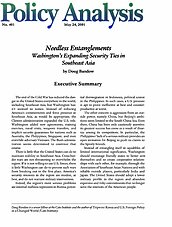There is little that the United States can do to maintain stability in Southeast Asia. Cross-border wars are not threatening to overwhelm the region. If it is not willing to use U.S. forces, there is little Washington can do to prevent such wars from breaking out in the first place. America’s security interests in the region are modest, at best, and do not warrant military intervention. Indeed, the region’s most serious problems are internal: ruthless repression in Burma, potential disintegration in Indonesia, political unrest in the Philippines. In such cases, a U.S. pressure is apt to prove ineffective at best and counter-productive at worst.
The other concern is aggression from an outside power, namely China, but Beijing’s ambitions seem limited to the South China Sea. Even there, China has been only cautiously assertive; its greatest success has come as a result of disarray among its competitors. In particular, the Philippines’ lack of a serious military provides an open invitation for Beijing to push its claims to the Spratly Islands.
Instead of entangling itself in squabbles of limited international significance, Washington should encourage friendly states to better arm themselves and to create cooperative relationships with each other, for example, through the Association of Southeast Asian Nations and with reliable outside players, particularly India and Japan. The United States should adopt a lower military profile in the region and abandon expensive and risky commitments that no longer serve the interests of the American people.


